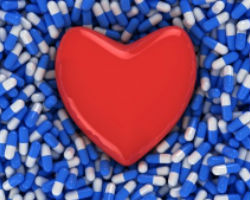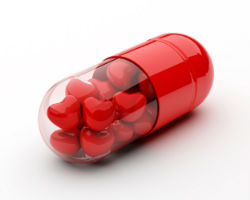Beneficial Medicines for the Heart

As you live your life, you gradually begin to realize how important it is to keep healthy. Some people realize it too late, when they are affected by a disease. It should be easy to realize early on. All you have to do is look around and see how poor health hinders a person’s life. Notice an overweight man at a bus stop wheezing and trying to stand up to catch the bus. He is not just overweight; the wheezing and shortness of breath with overweight people is usually caused by heart problems – one of the most common and debilitating problems a modern person can face.
The overabundance of food and the lack of movement have done their job and now more than 70% of people in the United States are either overweight or obese, with half of them having some sort of heart problem. However, even people who are not overweight can suffer the same fate. This can either be caused by poor genes which promote the development of atherosclerosis, or by some other heart-damaging disease.
What do we do to support our heart?
The question is: “How do we support our heart?” Yes, of course, everyone recommends losing weight, eating right, exercising, and they are all extremely important. No medicine in the world can do as much for you as good eating habits and regular exercise. However, what if it’s not enough? What if you are exercising 4 hours per day, eating right and you are still a bit chubby and feel some sort of heaviness in your heart?
If this is the case, a number of medicines may be of some value to you. It is necessary to help support your heart, to make it stronger and to improve your life so that you have the strength to do all the things you love do to.
Cholesterol Lowering Drugs
There is not a discussion about heart medicines that can avoid mentioning statins. This class of drugs inhibits an enzyme called HMG-CoA reductase, effectively lowering cholesterol levels. This is an important step in the prevention of heart disease since high cholesterol levels contribute to the development of atherosclerosis.
Atherosclerosis is the main risk factor for heart disease. The atherosclerotic process entails the development of atheromas on the inner lining of the arteries. These atheromas are first composed entirely of cholesterol and then become covered by a shell of calcium. These atheromas can grow and accumulate gradually obstructing the flow of the blood through the artery. Moreover, these atheromas can be damaged, which attracts a large number of platelets to the site quickly obstructing the artery. This often causes necrosis (death) of the tissues which the artery was feeding.
Not only do statins reduce the levels of cholesterol, the main component of atheromas but statins also stabilize the outer shell of the already formed atheromas. This reduces the risk of the atheroma shell being damaged, which in turn decreases the chances of a heart attack, stroke, and similar conditions.
Precaution!It is important to know that statins may result in myopathies caused by Coenzyme Q10 insufficiency. These myopathies can be life-threatening, although they appear very rarely. Myopathies came to public attention due to the use of Cervivastatin, which was withdrawn from production in 2001. Nevertheless, as a precaution, it is important to take Coenzyme Q10 supplements when taking statins even though there have been no major studies since 2007 proving the effectiveness of CoA Q10 supplementation in preventing rhabdomyolysis. CoA Q10 in itself is a supplement endorsed by many cardiologists. It increases the energy conversion in the myocardium and happens to be a powerful antioxidant.
Other medicines that are being used to lower the low-density lipoprotein and raise high-density lipoprotein are fenofibrate and gemfibrozil which belong to the fibrate class. They can be used alone or in combination with statins to increase the effect. Fibrates are also known for being very well-tolerated. Like statins, these drugs can also lead to myopathy and rhabdomyolysis, a life-threatening condition. The likelihood of this condition increases when statins are combined with fibrates.
Cytoprotective Metabolic Agents
Cytoprotective drugs are a group of chemical agents which provide protection to the cells by boosting their resistance against harmful agents. Cytoprotective drugs that are used to treat heart problems, increase the heart resistance to hypoxia (lack of oxygen) by increasing myocardial glucose utilization.
Trimetazidine – is a popular anti-ischemic metabolic agent that was developed by Les Laboratoires Servier in France. Trimetazidine functions by inhibiting beta-oxidation of fatty acids, which encourages glucose oxidation. This drug is primarily used as a long-term additional treatment of angina pectoris; however, it can also be used by people who are not diagnosed with any disease who wish to support their heart during rigorous exercises. This especially concerns older people.
Controlled studies have shown that trimetazidine can increase coronary flow reserve (the maximum blood flow through the heart’s coronary arteries), delay the onset of ischemia when the person is performing strenuous activities, limit swings in blood pressure without significantly affecting the heart rate, and significantly reduce the frequency of angina attacks. Trimetazidine is considered to be a drug with a high safety profile; however, it should not be administered to patients with movement disorders, including Parkinson’s disease, restless leg syndrome, and gait instability, since it may worsen their condition.
L-Carnitine – is a compound labeled as Vitamin BT, even though carnitine is not a true vitamin. L-carnitine is a biologically active form of carnitine, while D-carnitine is inactive. This compound is synthesized in the human body and is responsible for the transportation of long-chain acyl groups into the mitochondrial matrix. Thus, it plays an important role in utilization of fatty acids by the body. However, do not be fooled. L-carnitine cannot burn fat on its own; you have to perform rigorous exercises for it to start working. Additional supplementation of L-carnitine improves exercise performance and can be used as an additional treatment of heart failure, heart attack, angina pectoris, diabetic neuropathy and narcolepsy.
Antioxidants
Antioxidants are essential for the health of the human body. Their main purpose is to inactivate reactive oxygen species (oxygen ions and peroxides) that are formed within the body. These oxygen-based molecules naturally form within our body and they are responsible for the majority of cell damage. Supplying your body with additional antioxidants will help you prevent the damage caused by oxidative stress.
Coenzyme Q10 - plays an important role in protecting cell membranes from oxidative stress and protects DNA and proteins from being altered by reactive oxygen species.
Emoxypine – is a type of vitamin B6 first synthesized in Russia. This drug provides the user with cardioprotective and antiatherosclerotic functions. It can also lower cholesterol levels, inhibit thrombocyte aggregation and improve cerebral blood circulation. Aside from inhibiting free radical oxidation of cell membranes, it can also increase the activity of the body’s own antioxidant enzymes, namely the superoxide dismutase. It also inhibits the formation of free radicals during the synthesis of prostaglandins and blocks the formation of leukotriene (one of the main inflammatory mediators).
Conclusion
Of course the most surefire way to maintain a healthy heart is to perform regular exercises and eat right. However, modern medicine can offer a number of products which can help support the heart and significantly increase your quality of life. Although these drugs might not seem essential, they will be able to help you to get the most out of your life even if your youth is long gone.










